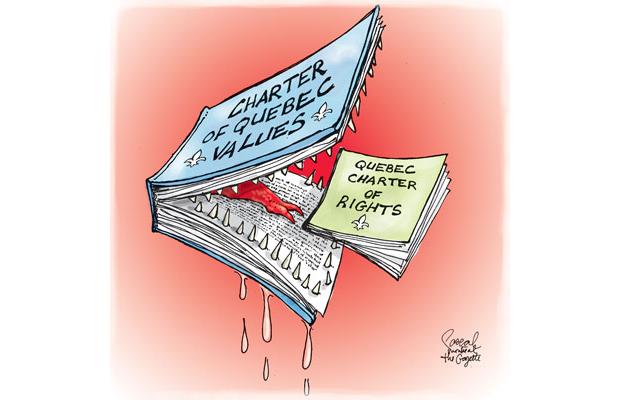
Cartoon by Pascal of the Montreal Gazette.http://www.montrealgazette.com/index.html
This cartoon by cartoonist Pascal from the September 13 2013
Montreal Gazette deals with the Charter of Quebec Values proposed by the ruling Parti Quebecois. In the cartoon, the Charter of Quebec Values is portrayed as a vicious monster who is salivating over the possible destruction of the Quebec Charter of Rights. The Quebec Charter of Values would ban the wearing of any "overt and conspicuous religious symbols by state personnel in carrying out their duties". That includes judges, police, school teachers, hospital workers, municipal employees and judges. It also bans any clothing that would cover the face of anyone who wants to receive government services.
A
recent poll says that the charter has strong support for Quebecois from outside urban areas, the middle-aged, people with less than a high school education, and people for whom French is their mother tongue.
Should religious symbols be banned? If so, why? Does banning the wearing of religious symbols interfere with the rights and freedoms of the individual over the collective norms of society? Should common "values" trump individual "rights"?
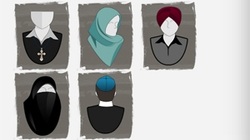 http://www.nosvaleurs.gouv.qc.ca/en/propositions/3
http://www.nosvaleurs.gouv.qc.ca/en/propositions/3 The image to the left shows symbols that would not be allowed under the charter. The main reason given by the government is to affirm the equality of men and women and to unify the people of the province. According to the government, " This restriction would reflect the state’s neutrality. "
What message is the cartoon conveying? How is it linked to liberalism? The source is trying to say that when a government action interferes with people's individual rights to express their beliefs, it is wrong. Rights are more important than values. It relates to the principle of individual rights and freedoms, which is a key principle of liberalism. Values, especially collective values, are not identified as a principle of liberalism. The source also relates to the collectivist principles of collective interest and collective responsibility.
The Charter promotes equality. No one should promote their own personal beliefs when they provide a government service. By doing so, the Charter interferes with individual rights. It tells people of all religions they have to put their beliefs aside when they work for the common good as government employees. It also implies that women who wear head coverings as part of their religion are oppressed. They wear the hijab because their culture treats them as less than equal.
I can see both sides on this issue. On the one hand, I think everyone has the right to practice their own religion. But what if that religion discriminates against others? Or discriminates against women? What if it gets in the way of their work? If I was a Muslim student in a classroom where the teacher wore a big crucifix every day, will I think I am being understood? If my doctor wears a burqa, how can I read her face? This is an interesting dilemma for all Canadians. We are all about multiculturalism, and we think everyone is equal- even if it is equal but different. When you work for the government, you are supposed to be neutral. Just the other day, I went to get my drivers licence renewed. Our registries office is privately run and the people who own it are members of a fundamentalist sect. The office is full of religious tracts trying to convert people to their way of thinking. Should their beliefs be in my face when I go to receive a mandatory government service? Or should people check their religion at the door when they go to work?
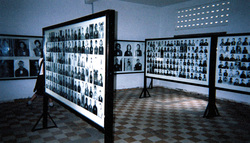
Khmer Rouge Prison, Cambodia,
What is the nature of humanity? Why is there torture, genocide, and terrorism in our world? Why do some people delight in tormenting others, as we recently saw in the
Amanda Todd case? And is there such a thing as "evil"? If there is, where does it come from and how do we stop it as a society?
Evil shows itself in the deliberate act of hurting someone or allowing someone to be hurt. It is describes as immorality or being wrong. Sometimes it is just defined as "the absence of good" or the absence of god, however you perceive that to be.
Cambridge professor Simon Baron-Cohen has explored the neuroscience between evil in his book "The Science of Evil."
Read an interview with the professor as broadcast on National Public Radio in the U.S. or watch the clip below. His studies have shown that evil sometimes comes from an absence of empathy, or the inability to recognize the feelings of others.
If we accept Edmund Burke's statement that Edmund Burke stated "All that is necessary for the triumph of evil is that good men do nothing," how should we respond to evil? Incarceration? Prevention? The death penalty? No matter where you believe evil comes from, dealing with it comes at the place where the common good intersects with individual rights and freedoms.
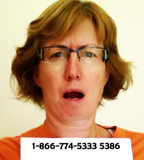
Me!
So the other evening I was randomly googling images of myself, (don’t ask why) and what should I find but the photo of another Nicola Ramsey on the
South Carolina Mugshot Database.
The other Nicola Ramsey lives in South Carolina.
The other Nicola was arrested for accepting stolen property.
I am not THAT Nicola Ramsey.
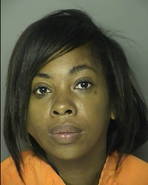
The other Nicola Ramsey
But the site got me thinking.
What if I was THAT Nicola Ramsey?
That would have been MY face plastered over the internet in an orange jumpsuit, looking like some kind of convict, when in fact I had not been tried or found guilty.
That would have been ME who would have to pay some unknown and unnamed corporation $99 to have my image removed from their site.
Oh yes, the fine print might say THAT Nicola Ramsey is presumed innocent- but the big print suggests otherwise.
There aren’t any similar websites in Canada, although the Canadian press does publish pictures of people who have been arrested in high profile cases. Governments in Ontario and Alberta maintain galleries of images of
people who have failed to provide child support payments. Is that any different? For a commentary on the Alberta Maintenance Enforcement site, see this
column from the Calgary Sun.
What about “innocent until proven guilty?” What about a person’s right to privacy? Who owns your image anyway? Is it in the public interest to publish photos of people who have been charged with a crime, if they have not been convicted? And how does it relate to the role of government in liberal democracies where elected officials and those who vote for them struggle to find a balance between individual rights and the common good?
 http://www.nosvaleurs.gouv.qc.ca/en/propositions/3
http://www.nosvaleurs.gouv.qc.ca/en/propositions/3 




 RSS Feed
RSS Feed